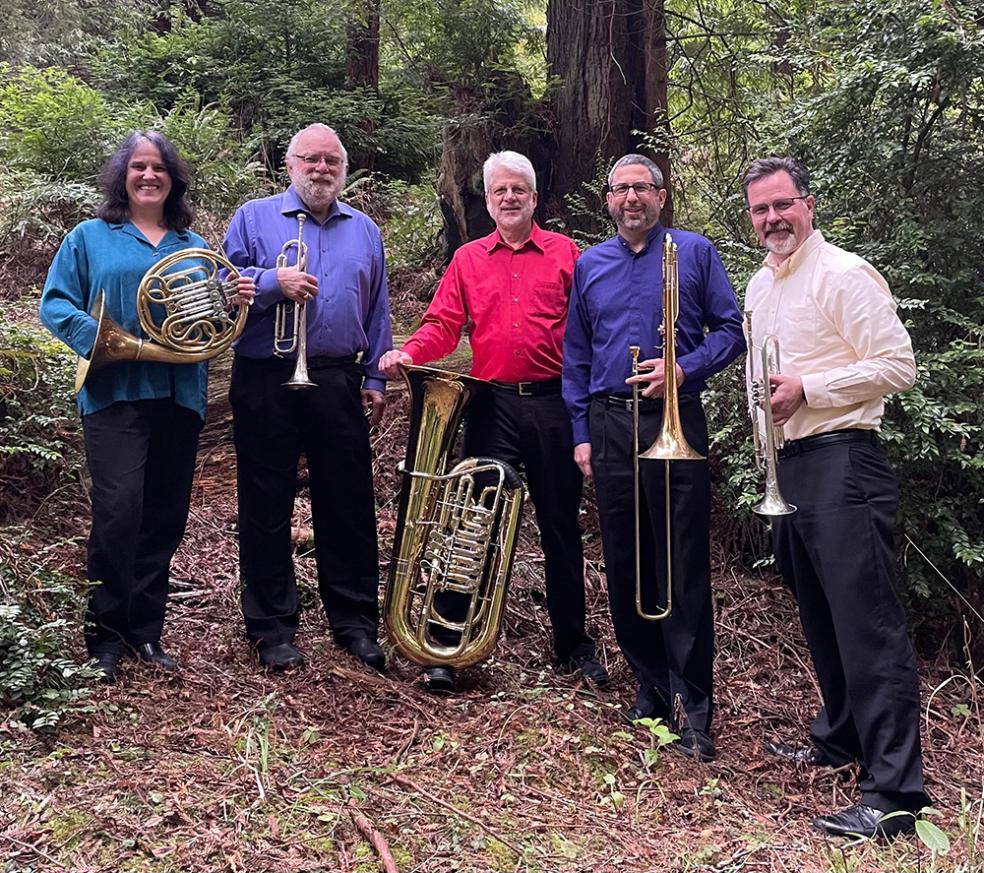
The evening’s performances include “Amid Hills” and “Beneath Rains” by Isaac Smith. Smith is a composer and performer of bright, engaging, and thoughtful new music. He is an Associate Instructor of Music Theory at the Jacobs School of Music in Bloomington, Indiana.
This performance of Amid Hills, Beneath Rains will feature brass players Chris Cox (trumpet), Andrew Henderson (trumpet), Michael Robertson (french horn), Dan Aldag (trombone), and Fred Tempas (tuba).
“Different Vibes,” composed by faculty member Brian Post, will be performed by MJ Fabian on the Vibraphone. It is an electro-acoustic, multimedia composition written for Vibraphone that has been created using Pythagorean tuning, wood blocks, electronics, and geometric visuals. It will sometimes be triggered live by the music being performed. The electronic portion of the piece, designed to be an accompaniment to the vibraphone, is a form of generative music created with code, using pure data, a graphic user interface computer programming language. The musical genre of the piece comes out of the Minimalist approach created in part by Terry Riley and Steve Reich. The music composed for the vibraphone was written to bring out the unique qualities of the Pythagorean tuning compared to standard tempered tuning, the typical tuning used in music today.
The classic aria opera “Donde lieta usci from La Bohème, Act III” by Giacomo Puccini, features Elisabeth Harringon, soprano, who will portray Mimi. In Act III of “La Bohème,” Mimi learns why Rodolfo acted irritably towards her. Her persistent cough and his dire financial straits have convinced Rodolfo that she would be better off without him. The two lovers agree that it would be best for them to separate once the warmer months of spring arrive. In this aria, Mimi bids Rodolfo a fond but tearful farewell. Harringon will be accompanied by John Chernoff, piano.
“Élégie Op. 24,” for cello and piano by Gabriel Fauré, features Garrick Woods on cello, and Daniela Mineva on the piano. In “Élégie,” the opening is a somber, long-breathed melody. The cello carries the main thematic material, with the piano providing a harmonically varied accompaniment.
Joining Woods and Mineva will be Chris Cox on trumpet. They will perform “Vocalise” for trumpet, cello, and piano by André Previn. In “Vocalise,” three “voices” enter a lamenting dialogue as equals. An expansive melody pulls us in some surprising and sensuously beautiful harmonic directions. The trumpet takes on the melody of the soprano in this arrangement.
“The Song That No One Likes” (2019) is a comedic parody of “certain” Broadway tunes. Written by Sarah Smallwood Parsons and Adrien Pellerin, this song was initially performed live by Smallwood Parsons on Characters Welcome, an ongoing live performance comedy show at the theater of the Upright Citizens Brigade. Elisabeth Harrington, soprano, will be accompanied by John Chernoff, piano.
“Passacaglia” is an original composition by faculty member MJ Fabian. Passacaglia is a duet for cello and percussion that takes inspiration from the titular classical form, which uses a repetitive bass line throughout a piece to establish continuity. Garrick Woods, cello, and MJ Fabian, percussion, will perform.
Concert tickets are $15 general, $5 children, and $5 for Cal Poly Humboldt students with ID. Tickets may be purchased at the door or in advance at centerarts.humboldt.edu, including our paid livestream ($7). From the "All Events" drop-down menu, select "Department of Dance, Music, and Theatre" and select the event.
To learn more about this and upcoming performances, visit Cal Poly Humboldt Music on Facebook at www.facebook.com/calpolyhumboldtmusic/